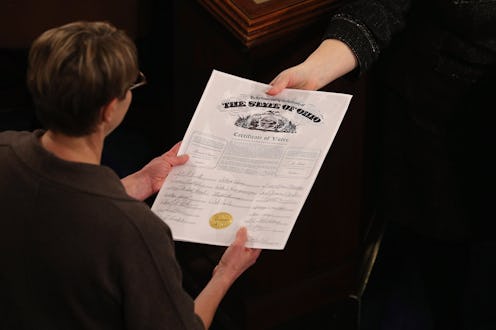News
This Number Of Faithless Electors Could Stop Trump
More than 4.7 million people have signed a petition on change.org asking electors to switch their votes from President-elect Donald Trump to Democratic nominee Hillary Clinton, spurring a flurry of debate over the likelihood of a flipped vote. So how many faithless electors are needed for Trump to lose the presidency?
Understanding how faithless electors could theoretically take the presidency from Trump requires first understanding how the Electoral College works. When you voted Nov. 8 you were actually casting ballots for a slate of electors who would elect the president as part of the Electoral College. Every political party with a candidate on the ballot selects a slate of electors in each state. As most states operate under a winner-take-all system, the slate of electors belonging to the party who's candidate receives the majority of the vote represents that state in the Electoral College.
While some states have opted to enact state laws or party pledges to bind their electors' votes to the results of the statewide election, there is no federal law or constitutional requirement mandating that electors must vote for the candidate that led the vote count in their state. Those who opt not to vote for their party's chosen candidate are commonly referred to as faithless electors. Faithless electors are uncommon, but not unheard of. In the Electoral College's more than 200-year history, there have been only 157 faithless electors, according to the nonprofit FairVote.
Determining how many faithless electors it would take to keep Trump from entering the White House is easy. With his win in Michigan, Trump has 306 electoral votes. To secure the presidency a candidate must win a majority, or 270 votes, in the Electoral College. That means 37 electors would have to flip their vote from Trump to another candidate to keep him from obtaining the required 270 majority.
Currently, Michael Baca and Bret Chiafalo, two electors from Colorado and Washington, respectively, are spearheading an effort to convince enough electors to break from their party's candidate and rally around what they call a "compromise candidate." They have so far reportedly convinced five other electors (three from Colorado and two more from Washington) to join them as "Hamilton Electors." The moniker being a nod to Alexander Hamilton, who wrote that, "The process of the Electoral College affords a moral certainty, that the office of the President will never fall to the lot of any man who is not in an eminent degree endowed with the requisite qualifications."
It's important to note that while a flipped Electoral College is constitutionally possible, it's also highly unlikely, according to experts. Moreover, if 37 electors flip their vote to a "compromise candidate" and thus keep both Trump and Clinton from obtaining a 270 majority, the task of electing the next president would fall to the Republican-controlled House of Representatives per the 12th Amendment.
